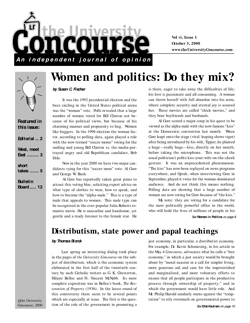The legitimacy of wealth
by Genevieve Belland
I would like to add a thought to Kathleen van Schaijik’s short editorial note on economics in the May 2000 issue of the Concourse Vol. V, issue 8. One of the Sunday readings of that same week addressed a similar topic.: “For if the eagerness [to give to the support of the Church] is there, it is acceptable according to what one has, not according to what one does not have; not that others should have relief while you are burdened, but that as a matter of equality your surplus at the present time should supply their needs, so that their surplus may also supply your needs, that there may be equality.” 2 Cor 8:12-14
This passage perhaps doesn’t speak directly of the legitimacy of amassing wealth; it deals more with not feeling pressured to give so much to the support of the Church that one’s own family is unnecessarily burdened. However, I think a principle which may be gleaned from this Scripture is that it is acceptable to strive to achieve a surplus. While as Christians we should imitate Christ our Savior who completely emptied Himself, we are not morally bound to live in material poverty. (“Blessed are the poor in spirit,” not necessarily poor in material goods.)
While I believe this Scripture doesn’t discourage the Christian from being rich, it still presents a challenge. Imitating Christ, we are to be generous in supporting our brethren. Essentially, we should live within our means (which is actually a very broad qualification, possibly taking into account one’s social status), and given out of our surplus. Whatever is left over after our needs (another potentially broad qualification) have been met, ought to be given to our poorer brethren.
Personally, I am all for hard work, personal achievement and striving to do well for oneself in this world. Our country was founded by hard-working individuals who were not ashamed of riches. The important thing to keep in mind is what they did with their wealth. Just consider all the historical monuments, libraries, hospitals and churches that have been built and continue to be maintained by wealthy people with a generous spirit. Finally, consider the history of our Western civilization—especially the period hailed by most as one of the most beautiful and creative: the Renaissance. Could the Renaissance and the Catholic Counter-Reformation have occurred in Europe without the generosity of wealthy patrons, such as the Medici family? I think not.
Genevieve Belland
Genevieve Belland graduated from FUS in ‘98. She has recently taken a position with Robert Royal at the Faith and Reason Institute in Washington, DC. She and her fiance, Gregory Erkens (‘98) will be married in November.


